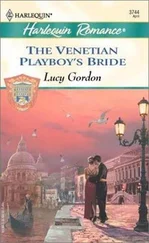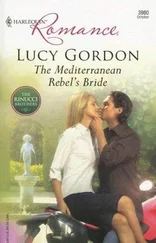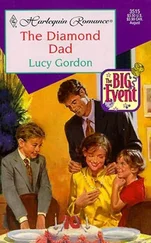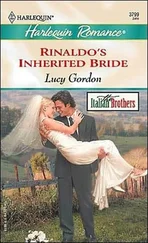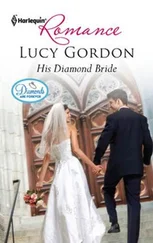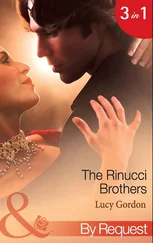Lucy Gordon - The Stand-In Bride
Здесь есть возможность читать онлайн «Lucy Gordon - The Stand-In Bride» — ознакомительный отрывок электронной книги совершенно бесплатно, а после прочтения отрывка купить полную версию. В некоторых случаях можно слушать аудио, скачать через торрент в формате fb2 и присутствует краткое содержание. Жанр: Современные любовные романы, на английском языке. Описание произведения, (предисловие) а так же отзывы посетителей доступны на портале библиотеки ЛибКат.
- Название:The Stand-In Bride
- Автор:
- Жанр:
- Год:неизвестен
- ISBN:нет данных
- Рейтинг книги:3 / 5. Голосов: 1
-
Избранное:Добавить в избранное
- Отзывы:
-
Ваша оценка:
- 60
- 1
- 2
- 3
- 4
- 5
The Stand-In Bride: краткое содержание, описание и аннотация
Предлагаем к чтению аннотацию, описание, краткое содержание или предисловие (зависит от того, что написал сам автор книги «The Stand-In Bride»). Если вы не нашли необходимую информацию о книге — напишите в комментариях, мы постараемся отыскать её.
The Stand-In Bride — читать онлайн ознакомительный отрывок
Ниже представлен текст книги, разбитый по страницам. Система сохранения места последней прочитанной страницы, позволяет с удобством читать онлайн бесплатно книгу «The Stand-In Bride», без необходимости каждый раз заново искать на чём Вы остановились. Поставьте закладку, и сможете в любой момент перейти на страницу, на которой закончили чтение.
Интервал:
Закладка:

Lucy Gordon
The Stand-In Bride
© 2001
CHAPTER ONE
C HRISTMASweather had come early. Although it was only the first day of December there was already the promise of snow, making the air sparkle and the street decorations gleam. High over London’s West End they shone against the darkness, multi-coloured confections of angels with long golden trumpets, elves, fairies dancing with long streamers, silver bells hanging in clusters.
But the two young women hurrying along the glittering street had no attention for the beauty overhead. They were arguing.
‘Catalina, please don’t be unreasonable,’ Maggie begged for the third time.
‘Unreasonable!’ Catalina snapped. ‘You want me to spend an evening looking at men wearing nighties and little skirts, and I’m unreasonable? Hah!’
‘ Julius Caesar is a great play. It’s a classic.’
Catalina made a sound that might have been a snort. She was eighteen, Spanish and looked magnificent in her blazing temper.
‘It’s Shakespeare,’ pleaded Maggie.
‘ That to Shakespeare!’
‘And your fiancé wants you to see it.’
Catalina said something deeply uncomplimentary about her fiancé.
‘Hush, be careful!’ Maggie urged, looking around hurriedly, as though Don Sebastian de Santiago might appear from thin air.
‘Pooh! I am here in London; he is in Spain. Soon I shall be his prisoner, and behave myself, and say, “Yes, Sebastian,” and “No, Sebastian,” and “Whatever you say, Sebastian.” But until then I do what I like, I say what I like, and I say I don’t like men with knobbles on their knees wearing skirts.’
‘They probably don’t all have knobbles on their knees,’ Maggie said, trying to lighten the atmosphere.
Catalina let forth a torrent of Spanish and Maggie hastily seized her arm and steered her along the road, weaving in and out of the seething crowd. ‘It was supposed to be part of your English education,’ she said.
‘I am Spanish; he is Spanish. Why I need an English education?’
‘Why do I need-’ Maggie corrected her automatically.
‘Why do I need an English education?’ Catalina repeated in exasperation.
‘For the same reason you needed a French education, so that you can be a cultivated woman and host his dinner parties.’
Before her rebellious charge could answer, Maggie steered her into a teashop, found a table and said, ‘Sit!’, much as she would have done to a recalcitrant puppy. The young Spanish girl was delightful but exhausting. Soon Maggie would see her off to Spain and retire to the peace of a nervous breakdown.
For the last three months it had been Maggie’s job to perfect Catalina’s English and share chaperoning duties with Isabella, her middle-aged duenna. The two Spanish women lived in one of London’s most luxurious hotels, courtesy of Don Sebastian, who had also arranged the highlights of their schedule, and paid Maggie’s wages.
The whole thing had been arranged at a distance. It was six months since Don Sebastian had last found time to see his fiancée, and that had been on a flying visit to Paris, during which he seemed to have checked the improvement in her French, and little else.
Day-to-day decisions were in the hands of Donna Isabella, who hired teachers locally, communicated with Sebastian and relayed her employer’s wishes to her employer’s bride-to-be.
He was in America at the moment, expected to arrive in London the following week, after which Catalina would accompany him back to Spain to begin preparing for her wedding. Or possibly he wouldn’t have time to come to London at all, in which case they would travel without him. Whatever else he could be accused of, Maggie thought, it wasn’t flaming ardour.
She couldn’t imagine what he was thinking of to choose a wife so totally unsuitable. Catalina was ignorant and empty-headed-clothes-mad, pop music-mad, boy-mad. By no stretch of the imagination was she a proper consort for a serious man with a seat in the regional Andalucian government.
Catalina’s efforts to master languages were halfhearted. She managed fairly well with English because she’d watched so many American television programs, but her French was dire, and her German had been a waste of everybody’s time.
Yet Maggie was fond of her. Exasperating Catalina might be, but she was also kind, warm-hearted and fun. She needed a young husband who would be entranced by her beauty and high spirits, and care nothing for her lack of brains. Instead she would soon be imprisoned in a world of premature middle age.
‘All right,’ Maggie said as they ate tea and cakes. ‘What do you want to do this evening?’
‘Die!’ Catalina declared passionately.
‘Short of that,’ Maggie said, firmly dousing melodrama with common sense.
‘What does it matter? In a few weeks my life will be over anyway. I will be an old married woman with an old husband and a baby every year.’
‘Is Don Sebastian really old?’ Maggie asked.
Catalina shrugged. ‘Old, middle-aged. So what?’
‘I wish you had a picture of him.’
‘Is bad enough I have to marry him. What for I want his picture?’
‘Anyone would think I hadn’t taught you any English,’ Maggie complained. ‘It’s not “what for I want his picture?”, it’s “Why should I want his picture?” Now, let’s try it. I say, “I wish you had his picture”, and you say-?’
‘I say if I have his picture here, I stamp on it.’
Maggie gave up.
‘Maybe he’s only middle-aged outside, but he’s old in here .’ The girl tapped her forehead, then her chest. ‘And it’s in there that counts.’
Maggie nodded. She knew only too well how a man could look one thing and be another. Four years of marriage had taught her that. Blissful happiness, followed by disillusion, then heartbreak, disgust and despair. To cover her sudden tension she ordered more tea.
The two women made a study in contrasts-the one still in her teens, all proud, passionate Spanish beauty, dark, glittering eyes and a warm complexion, and the other in her late twenties, with soft fair skin, dark brown eyes and light brown hair. Catalina was tiny, built on dainty lines, but her lively temper and excitable personality tended to make her the centre of attention.
Maggie was tall and statuesque, but her manners were so quiet that she could be overlooked beside the magnificent Catalina. Yet she too had a touch of the Mediterranean. Her grandfather had been Alfonso Cortez, a Spaniard from Andalucia who had fallen madly in love with an Englishwoman spending a week in Spain. When it was over he’d pursued her all the way home, never seeing his own country again.
From him Maggie had inherited her large, dark eyes that suggested unfathomable depths. They were alluring in themselves, but doubly so against the Anglo-Saxon pallor of her skin. Observers would have summed Catalina up in an instant, but would have lingered over Maggie, puzzling over her mystery, and the pain and bitterness that she strove to hide. They might have read the sensuality and humour in her mouth. The sensuality she tried to conceal, even from herself. The humour was her weapon against the world. Once, and it seemed a long time ago, she had laughed all the time. Now she laughed to protect her privacy.
‘If you feel like that about your fiancé, you should tell him,’ she said.
‘You think Sebastian would let me go, after he’s spent two years grooming me? Everything I do is under his control. I am taught what he wants me to know-languages, how to dress, how to eat, how to behave.
Читать дальшеИнтервал:
Закладка:
Похожие книги на «The Stand-In Bride»
Представляем Вашему вниманию похожие книги на «The Stand-In Bride» списком для выбора. Мы отобрали схожую по названию и смыслу литературу в надежде предоставить читателям больше вариантов отыскать новые, интересные, ещё непрочитанные произведения.
Обсуждение, отзывы о книге «The Stand-In Bride» и просто собственные мнения читателей. Оставьте ваши комментарии, напишите, что Вы думаете о произведении, его смысле или главных героях. Укажите что конкретно понравилось, а что нет, и почему Вы так считаете.

